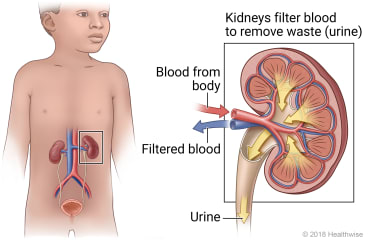
What are they?
Creatinine tests measure the level of the waste product creatinine (say "kree-AT-uh-neen") in your child's blood and urine. These tests show how well your child's kidneys are working.
Why are these tests done?
A blood creatinine level or a creatinine clearance test is done to:
- See if your child's kidneys are working normally.
- See if a medicine is affecting your child's kidneys.
- See if your child's kidney disease is staying the same or getting better or worse.
How do you prepare for the tests?
Your child may be asked to:
- Not do any hard exercise for 2 days (48 hours) before the test.
- Not eat more than 8 ounces of meat, especially beef, or other protein for 24 hours before the blood creatinine test and during the creatinine clearance urine test.
- Drink plenty of fluids if your child will need to collect his or her urine for 24 hours. But don't let your child drink coffee or tea. These cause your child's body to pass more urine than normal.
If you are asked to collect urine, your doctor will give you a large container that holds about 1 gallon. You will use the container to collect your child's urine for 24 hours.
Tell your doctor ALL the medicines, vitamins, supplements, and herbal remedies your child takes. Some may affect the results of the test. Your doctor will tell you if your child should stop taking any of them before the test and how soon to do it.
How are the tests done?
A health professional uses a needle to take a blood sample, usually from the arm.
How to do the test
Your child's urine is collected for a period of time, such as over 4 or 24 hours. Your doctor will give you a large container that holds about 1 gallon. You will use the container to collect your child's urine.
- When your child first gets up, have your child urinate.
But don't save this urine. Write down the time your child urinated.
- For the set period of time, collect all your child's urine.
Each time your child urinates during this time period, collect the urine in a small, clean container. Then pour the urine into the large container. Don't touch the inside of either container with your fingers.
- Don't let toilet paper, pubic hair, stool (feces), menstrual blood, or anything else get in the urine sample.
- Keep the collected urine in the refrigerator for the collection time.
- Have your child empty their bladder for the last time at or just before the end of the collection period.
Add this urine to the large container. Then write down the time.
How long do the tests take?
The urine test will take 24 hours. The blood test will take a few minutes.
What happens after the tests?
- Your child will probably be able to go home right away.
- Your child can go back to his or her usual activities right away.
Follow-up care is a key part of your child's treatment and safety. Be sure to make and go to all appointments, and call your doctor if your child is having problems. Ask your doctor when you can expect to have your child's test results.
Where can you learn more?
Go to http://www.healthwise.net/patientEd
Enter C190 in the search box to learn more about "Creatinine and Creatinine Clearance Tests: About Your Child's Tests".
Current as of: September 25, 2025
Author: Ignite Healthwise, LLC Staff
Clinical Review Board
All Ignite Healthwise, LLC education is reviewed by a team that includes physicians, nurses, advanced practitioners, registered dieticians, and other healthcare professionals.

